If you’re considering building or expanding your online store, chances are you’ve stumbled upon both Shopify and Shopify Plus. Although they belong to the same platform family, each one is tailored for different business sizes and objectives.
Each option comes with its own unique features, pricing, and tools, so picking the right one can significantly impact how efficiently your business operates and grows.
In this article, we’ll dive into what sets Shopify and Shopify Plus apart, weigh their pros and cons, and guide you in determining which one aligns best with your business needs.
By the time you wrap up reading, you’ll feel assured about which platform can help you achieve your goals and elevate your store to new heights.
Shopify vs Shopify Plus: A Quick Comparison
Before jumping to the complete comparison, here’s a quick comparison table for busy readers:
| Feature | Shopify | Shopify Plus |
|---|---|---|
| Target Audience | Small to medium-sized businesses | High-volume enterprise businesses |
| Pricing | Starts at $5/month | Starts at $2,300/month |
| Features | Basic e-commerce features, app store, limited staff accounts | Advanced features, unlimited staff accounts, dedicated account manager |
| API Access | Limited | Extensive API access and customization options |
| Transaction Fees | 0.5% to 2% depending on plan | 0.15% or lower |
| Themes | Wide variety of free and paid themes | More advanced and customizable themes |
| Support | 24/7 email and chat support | 24/7 priority phone, email, and chat support |
| Scalability | Can handle moderate growth | Designed for high-volume sales and traffic, easily scalable |
| Internationalization | Basic features like multiple languages and currencies | Advanced features like multi-store management, custom duties and taxes |
| B2B Features | Limited | Wholesale channel, custom pricing, and company accounts |
| Marketing & Automation | Basic automation features | Launchpad for flash sales and campaigns, Script Editor for custom backend logic |
| Integrations | Wide range of app integrations | Custom integrations for enterprise systems |
What Is Shopify?
Shopify is a renowned e-commerce platform that provides businesses of all sizes with an extensive suite of tools and features to establish and manage their online presence.

It’s renowned for its user-friendly interface, scalable functionality, and robust set of built-in capabilities that cater to the needs of both small startups and established enterprises.
Key Features Of Shopify
- Intuitive Storefront Builder: Shopify offers a wide selection of professionally designed, mobile-responsive themes, allowing merchants to create visually appealing and highly customizable online stores with minimal technical expertise.
- Integrated Payment Processing: Shopify Payments, the platform’s built-in payment gateway, enables seamless and secure transactions, eliminating the need for third-party payment integrations.
- Multichannel Selling: Shopify’s integration with numerous sales channels, including social media platforms and marketplaces, enables merchants to expand their reach and tap into diverse customer bases.
- Robust Inventory Management: The platform provides comprehensive tools for managing product listings, tracking inventory levels, and automating order fulfillment processes.
- Powerful Analytics and Reporting: Shopify offers a suite of analytics and reporting features, providing merchants with valuable insights into their store’s performance, customer behavior, and sales trends.
- Scalable and Secure Infrastructure: Shopify’s cloud-based architecture ensures reliable uptime, automatic software updates, and robust security features, allowing merchants to focus on growing their business without worrying about infrastructure management.
What Is Shopify Plus?
Shopify Plus is the enterprise-level solution within the Shopify ecosystem, designed to cater to the needs of larger, high-volume businesses and brands.
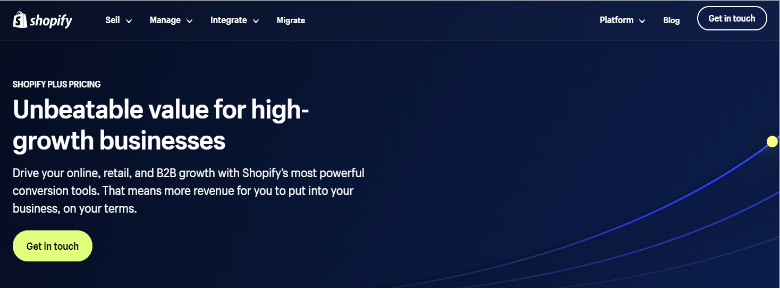
While it shares some fundamental features with the standard Shopify platform, Shopify Plus offers a range of advanced capabilities and tailored services to meet the unique requirements of enterprise-level e-commerce operations.
Key Features Of Shopify Plus
- Dedicated Account Management: Shopify Plus provides merchants with a dedicated account manager, who serves as a strategic partner, offering guidance, support, and customized solutions to address their specific business needs.
- Unlimited Customization: Shopify Plus grants merchants greater control over their storefront’s design and functionality, allowing them to create highly customized and branded shopping experiences through the use of custom scripts, liquid templates, and advanced APIs.
- Increased API Calls and Bandwidth: Shopify Plus offers increased API call limits and unlimited bandwidth, enabling merchants to handle high-traffic volumes and integrate with complex third-party systems and applications.
- Dedicated Merchant Success Program: Shopify Plus customers gain access to the Merchant Success Program, which provides ongoing training, best practices, and support to help them optimize their e-commerce operations and achieve their growth goals.
- Enhanced Reporting and Analytics: Shopify Plus offers more advanced reporting and analytics capabilities, providing merchants with deeper insights into their sales, customer behavior, and overall business performance.
- Streamlined B2B Functionality: Shopify Plus includes specialized features for B2B e-commerce, such as password-protected wholesale portals, custom pricing, and bulk account management, catering to the needs of businesses serving both retail and wholesale customers.
- Multistore Management: Shopify Plus enables merchants to manage multiple online stores from a single, centralized dashboard, making it an ideal solution for businesses with a global or omnichannel presence.
Shopify vs. Shopify Plus: Pricing Comparison
One of the most significant differences between Shopify and Shopify Plus is the pricing structure. Shopify offers a range of fixed pricing plans, while Shopify Plus follows a more customized approach based on the specific needs of the merchant.
Shopify Standard Pricing Plans
Shopify’s pricing plans are as follows:
| Features | Basic Plan | Grow Plan | Advanced Plan |
|---|---|---|---|
| Monthly Pricing | $39/mo | $105/mo | $399/mo |
| Yearly Pricing | $29/mo | $79/mo | $299/mo |
| 3-day free trial + 3 months at $1/mo | ✅ | ✅ | ✅ |
| Shopify Sidekick | ✅ | ✅ | ✅ |
| SSL Certificate | Free | Free | Free |
| Abandoned Cart Recovery | ✓ | ✓ | ✓ |
| Unlimited Products | ✓ | ✓ | ✓ |
| Reports and Analytics | Standard | Standard | Custom |
| International Pricing | ✓ | ✓ | ✓ |
| Staff Accounts | ❌ | 5 | 15 |
| Print Shipping Labels | ✓ | ✓ | ✓ |
| Shipping Discount | Up to 77% | Up to 88% | Up to 88% |
| 24×7 Support | Via chat | Via chat | 24×7 Support |
| Credit Card Fee | 2.9% + 30¢ | 2.7% + 30¢ | 2.5% + 30¢ |
| Inventory Locations | 10 | 10 | 10 |
| Manual Order Creations | ✓ | ✓ | ✓ |
| Third-Party Transaction Fee | 2% | 1% | 0.5% |
| Multiple Language | ✓ | ✓ | ✓ |
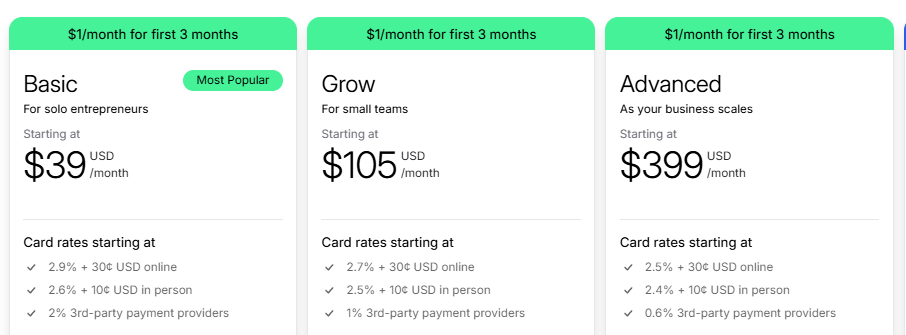
These plans are subject to additional transaction fees, which vary depending on the payment gateway used. Speaking of which, Shopify Payments, the platform’s integrated payment solution, offers the most competitive transaction rates.
Bonus: New Shopify users can try their chosen plan for 3 months at only $1 per month after starting with the 3-day free trial.
Shopify Plus Pricing
Shopify Plus pricing is more flexible and tailored to the needs of larger enterprises.
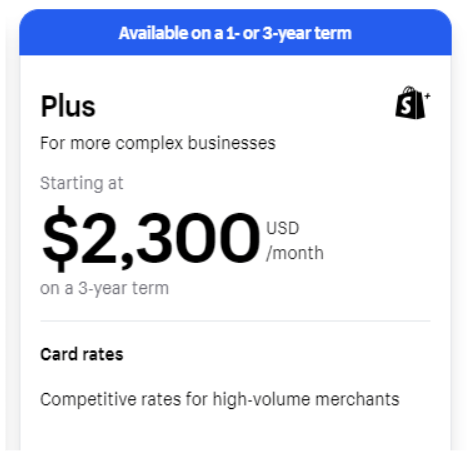
The starting point for Shopify Plus is $2,300 per month when signed for a 3-year term, but the final cost can vary based on factors such as:
- Transaction Fees: Shopify Plus offers lower transaction fees compared to the standard Shopify plans, typically ranging from 2.4% + $0.30 for domestic transactions to 2.9% + $0.30 for international and American Express transactions.
- Customization and Development: Shopify Plus merchants may require additional development and customization services, which can increase the overall cost of the platform.
- Third-Party Apps and Integrations: Shopify Plus users may need to invest in premium third-party apps and integrations to meet their specific business requirements, adding to the overall cost.
Note: Shopify Plus pricing is negotiable and can be customized based on the merchant’s unique needs and the expected sales volume of the business.
Key Differences Between Shopify And Shopify Plus
While Shopify and Shopify Plus share a common foundation, there are several critical differences that set them apart. Understanding these distinctions can help you determine which platform best aligns with your business requirements and growth aspirations.
1. Customization And Flexibility
Shopify: The standard Shopify platform offers a range of customization options, including the ability to modify themes, add third-party apps, and create custom content.
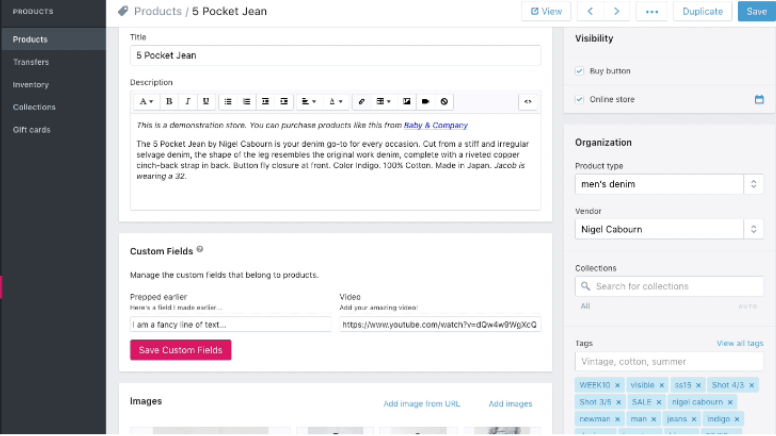
However, the level of customization is relatively limited compared to Shopify Plus.
Shopify Plus: Shopify Plus provides merchants with significantly more customization capabilities, including access to the platform’s Liquid templating language, custom scripts, and a highly flexible checkout experience.
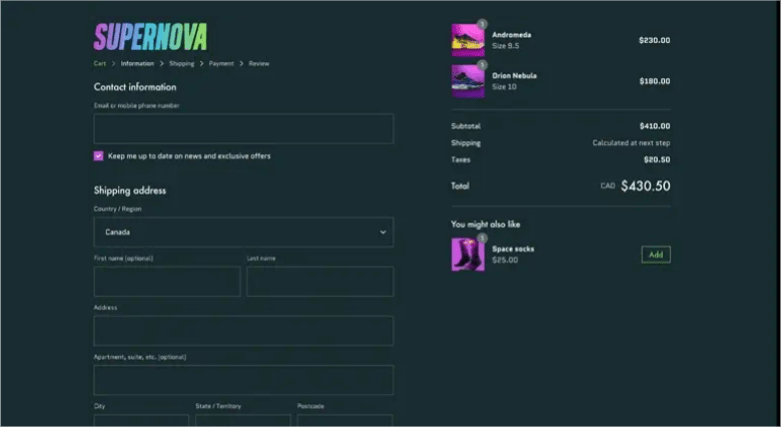
This enhanced customization allows Shopify Plus users to create truly unique and branded shopping experiences.
2. Scalability And Performance
Shopify: Shopify is a highly scalable platform capable of supporting a wide range of businesses, from small startups to medium-sized enterprises. However, as a merchant’s sales volume and traffic increase, the platform may face some limitations in terms of API calls, bandwidth, and overall performance.
Shopify Plus: Designed for high-volume, enterprise-level businesses, Shopify Plus offers significantly more robust scalability and performance capabilities. Shopify Plus users enjoy increased API call limits, unlimited bandwidth, and access to advanced features like Shopify Flow and Launchpad, which help streamline and automate complex e-commerce workflows.
3. Merchant Support And Success
Shopify: Shopify offers a comprehensive knowledge base, community forums, and 24/7 customer support to assist its merchants. However, the level of personalized guidance and strategic support may be limited for standard Shopify users.
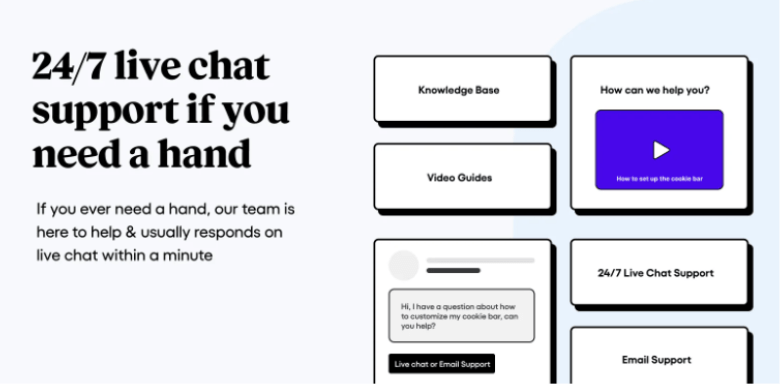
Shopify Plus: Shopify Plus provides merchants with a dedicated account manager, who serves as a strategic partner, offering customized solutions, best practices, and ongoing support to help them optimize their e-commerce operations and achieve their growth goals.
Shopify Plus users also have access to the Merchant Success Program, which provides exclusive resources and training to help them succeed.
4. B2B Functionality
Shopify: While Shopify does offer some basic B2B features, such as the ability to create password-protected wholesale portals, the platform’s capabilities in this area are more limited compared to Shopify Plus.
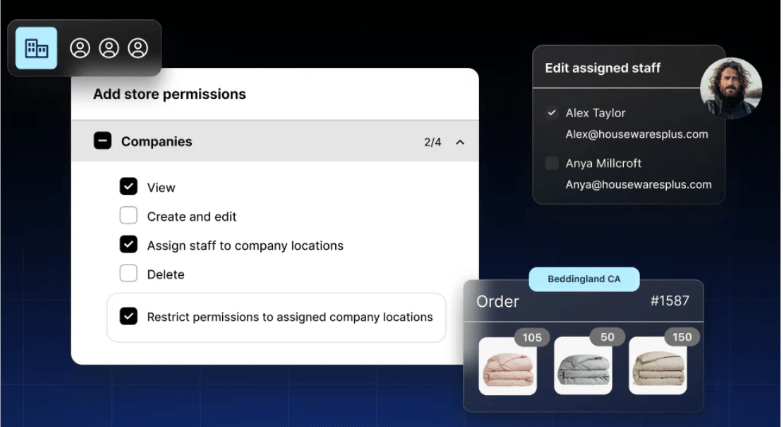
Shopify Plus: Shopify Plus is designed with advanced B2B functionality in mind, offering features like custom pricing, bulk account management, and dedicated wholesale channels.
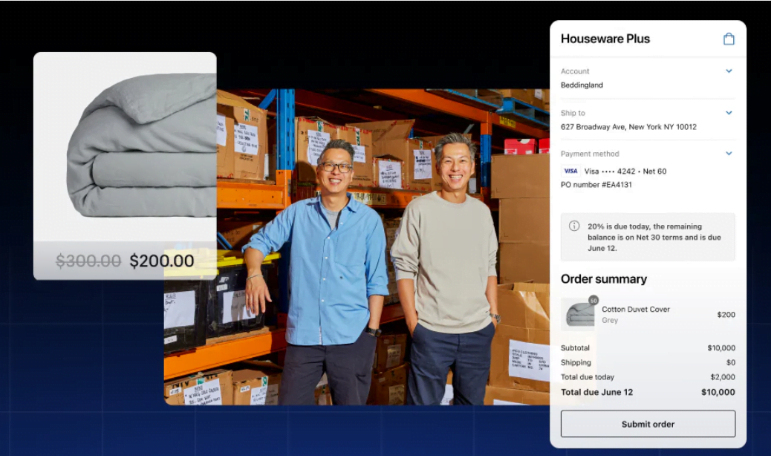
These capabilities make Shopify Plus an attractive choice for businesses that serve both retail and wholesale customers.
5. Reporting And Analytics
Shopify: Shopify’s reporting and analytics capabilities, while comprehensive, are primarily focused on standard e-commerce metrics, such as sales, customer data, and inventory management.
Shopify Plus: Shopify Plus provides more advanced reporting and analytics features, enabling merchants to gain deeper insights into their business performance, customer behavior, and overall operational efficiency. This includes access to custom dashboards, enhanced segmentation, and the ability to export data for further analysis.
6. Pricing And Transaction Fees
Shopify: Shopify’s pricing is structured in a straightforward manner, with a range of fixed monthly plans. However, merchants are subject to transaction fees, which can vary depending on the payment gateway used.
Shopify Plus: Shopify Plus pricing is more flexible and customized, with a starting point of $2,300 per month. While Shopify Plus users may incur additional costs for customization, development, and third-party integrations, they typically enjoy lower transaction fees compared to standard Shopify plans.
Choosing Between Shopify And Shopify Plus
Deciding between Shopify and Shopify Plus ultimately depends on the specific needs and growth aspirations of your business. Here are some key factors to consider when making your choice:
1. Business Size And Growth Potential
Shopify: Shopify is an excellent choice for small to medium-sized businesses, startups, and entrepreneurs who are just starting their e-commerce journey. The platform’s user-friendly interface, extensive app ecosystem, and scalable features make it a great fit for businesses with moderate sales volumes and growth expectations.
Shopify Plus: Shopify Plus is tailored for larger, enterprise-level businesses with high-volume sales and complex e-commerce requirements. If your business is experiencing rapid growth, requires advanced customization and automation capabilities, or serves both retail and wholesale customers, Shopify Plus may be the more suitable option.
2. Budget And Pricing Constraints
Shopify: Shopify’s fixed pricing plans can be an attractive option for businesses with more limited budgets or those who are just starting to establish their online presence. The platform’s transparent pricing structure and range of plan options make it easier to forecast and manage e-commerce costs.
Shopify Plus: Shopify Plus’s customizable pricing structure may be better suited for businesses with more flexible budgets and a willingness to invest in advanced features and capabilities that can drive long-term growth and profitability. However, the pricing depends on yearly terms. The longer the contract, the less you have to pay monthly.
3. Customization And Branding Needs
Shopify: Shopify’s customization options, while extensive, may not be sufficient for businesses that require a high degree of control over their storefront’s design and functionality. If your brand has specific visual or technical requirements, Shopify’s built-in features may not fully accommodate your needs.
Shopify Plus: Shopify Plus’s enhanced customization capabilities, including access to custom scripts, liquid templates, and advanced APIs, make it an ideal choice for businesses that want to create truly unique and branded shopping experiences. If you require a high level of control over your e-commerce platform, Shopify Plus may be the better option.
4. Technical Expertise And Support Requirements
Shopify: Shopify’s user-friendly interface and extensive app ecosystem make it a suitable choice for businesses with limited technical expertise or those who prefer a more hands-off approach to e-commerce management. The platform’s customer support and knowledge base can help guide merchants through various setup and operational tasks.
Shopify Plus: Shopify Plus’s advanced features and customization capabilities may require a higher level of technical expertise, both in terms of in-house resources and the ability to leverage the platform’s more complex functionalities. However, the Shopify Plus Merchant Success Program and dedicated account managers can provide the necessary guidance and support to help businesses maximize the platform’s potential.
Related Reads:
Conclusion: Shopify for Beginners, Shopify Plus for Growing Enterprises
When you look at Shopify and Shopify Plus, it is clear that they cater to a variety of traders, even if they are built on the same strong foundation.
Shopify is a great option for small-to medium-sized businesses, startups, and entrepreneurs who want a tropical, scalable, and budget-friendly e-commerce platform. With your user-friendly interface, comprehensive app marketplace, and clear pricing, it is right for businesses as a target for stable growth.
On the other hand, Shopify Plus is suited to large, enterprise-level companies that deal with high sales volumes and require advanced adaptation, automation, and more complex e-commerce solutions.
If you are thinking about Shopify Plus, it may be a good idea to check the free tests given on Shopify’s regular plans. You can know that one of those schemes meets your requirements without the additional expenses of Shopify Plus.
